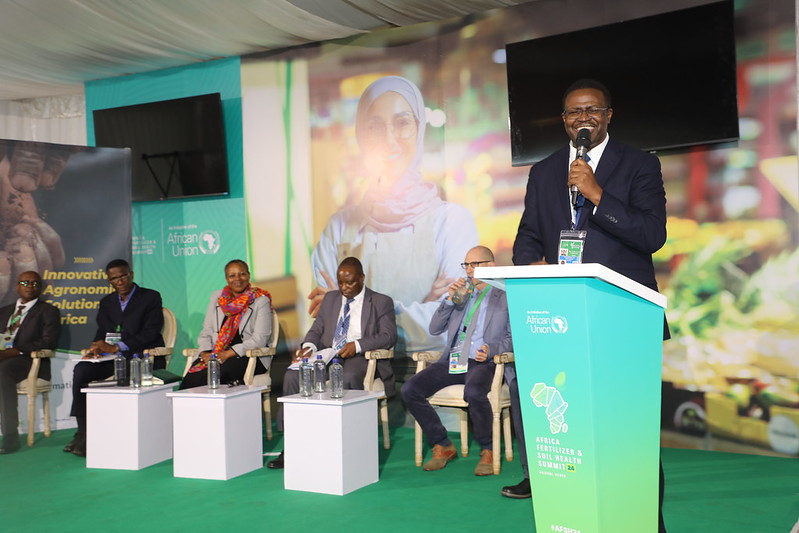TAAT highlights Innovative Agronomic Solutions for Healthy Soils at the Africa Fertiliser and Soil Health Summit

In response to the recommendation of its policy organ, the Department of Agriculture, Rural Development, Blue Economy and Environment (DARBE), the African Union (AU) is hosting the Africa Fertiliser and Soil Health Summit in Nairobi, Kenya.
The summit, which held from 7 – 9 May, 2024, was organised in collaboration with the African Union Development Agency-NEPAD, Regional Economic Communities and partners.
The Africa Fertilizer and Soil Health Summit deliberated on Africa’s recent widespread decades-long decline in soil quality of farmland – a phenomenon that continues today and negatively impacts the agricultural production capacity and food security in the continent.
It was within this framework that Technologies for African Agricultural Transformation (TAAT), in collaboration with the CGIAR Excellence in Agronomy Initiative, hosted on the sidelines of the summit, a side event on healthy soils for food system transformation – innovative agronomic solutions for Africa.
The side event unveiled Innovative Agronomic Solutions for Africa from the TAAT e-catalogue and the CGIAR Excellence in Agronomy (EiA) Initiative. The event provided vistas on the scale-up of practical solutions and recommendations rooted in proven technologies for enhancing soil fertility management, addressing acid soil issues, and promoting sustainable landscape management.
In a keynote address, Dr Martin Fregene, Director of Agriculture and Agro-industry at the African Development Bank, underlined the fact that farmers are rational people, but need assistance to enhance their productivity hence the bank’s considerable investment in soil health initiatives across Africa.
According to Dr Solomon Gizaw, the Head of TAAT Clearinghouse, “TAAT, in collaboration with the EiA working with leading technology developers and demand partners, have acquired and vetted cutting-edge soil fertility innovations for scaling readiness and have integrated them into an electronic technology catalogue, which is accessible to everyone through a click of the mouse.”
Represented by Dr Charles Murekezi, Dr Gizaw added that TAAT through its Regional Technology Delivery Infrastructure (RTDI), works within investments provided by the African Development Bank to countries in order to facilitate the integration of proven fertiliser and soil health solutions.
Mr Mandle Nkomo, the Chief Growth Officer at the CGIAR Excellence in Agronomy Initiative (EiA) in his presentation called for intentional actions, not accidental ones, to transform African agriculture. These he linked to checking the impact of soil health on soil productivity, inspiring farmers to instigate agricultural transformation, and providing technologies that respond to fertiliser and soil health challenges faced by farmers.
“At EiA, we have created a demand driven system listening to farmers’ pain points. What crops to plant, what inputs to use, how much, potential yields, and these require a rigorous scientific process to ably respond. Understanding the demand and turning the demand into science-based solutions is what we do, Mr Nkomo added.
Other speakers and panelists at the event including Dr Bruno Tran, Dr Jordan Chamberlain, Dr Paul and Ms Wanjiku Guchu and Dr Ekwe Dossa unveiled a panorama of scaleable cutting-edge soil health and sustainable fertiliser practices with enormous potential to unlock new opportunities for growth, enhance agricultural productivity, and create a more resilient farming landscape across Africa.
It would be recalled that in June 2006, the Heads of State and Governments of the African Union endorsed the Abuja Declaration on Fertilizer for the Africa Green Revolution, a continental strategy to reverse the worrying trend of poor productivity of the African soils.
The Declaration focused on key targets required for agricultural growth, food security, and rural development in Africa, focusing on the role of fertilizers. It recommended raising the use of fertilizers from 8 kg/(nutrients)/ha to 50 kg (nutrients) /ha in 10 years and the establishment of an African Fertilizer Financing Mechanism (AFFM) with the objective of improving agricultural productivity by providing financing required to boost fertilizer use in Africa to achieve the target of 50 kg of nutrients per hectare, as mandated by the Abuja Declaration.
Certain key outcomes expected at the summit, including the 10-year Fertilizer and Soil Health Action Plan, the Soil Initiative for Africa framework and the Nairobi Declaration on Fertilizer and Soil Health were adopted for implementation during the special session of the Heads of States and Governments at the summit. A partnership agreement between TAAT and the EiA was signed at the end of the side event.


